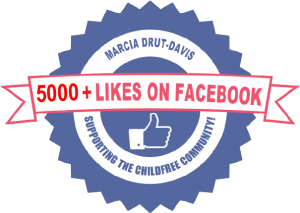In this blog, I hope to give you pointers to stop any confrontation to remain childfree by choice. Remember, most of the time, people will mean well. They chose to have children. Many of them are happy. The ones who aren’t will rarely tell you that but want you to suffer along.
Remember:
1.Your goal isn’t to defend a personal choice.
Just like parents are rarely made to defend their choice, neither should you. A simple statement saying you prefer the childfree -by -choice lifestyle is all that’s necessary. Don’t go into details or pronounce how much you love kids when you may or may not. Don’t explain the myriad of reasons parenting turns you off cold. In my opinion, it’s none of their business. If you start getting the “BUT,BUT, BUTS, ask this question: “Are you happy being a parent?” Most often they’ll reply with exuberance, “YES!” Say, “That’s exactly how I feel. Happy!” If you get the,”You’ll change your mind or you’ll regret this someday”, say, “You may be right!” Then, walk away or change the conversation. If they say,”Isn’t that selfish?” Your answer is, “You may be right”. Change the conversation again. Get the picture?
Ask yourself if you have to win that conversation about not having or raising children? If anger is created and you feel your blood boiling because of others ignorance, “You may be right” then walk away! You can go home to the peace of your lifestyle. They can’t. (Off the record, if by any small chance they ARE right, I would rather regret not having children than having them.)
2. Timing is everything.
Pick the right time to be truthful. If you’re feeling annoyed at work, that’s NOT the right time. If you’re not feeling well, that’s not the right time. If there are more of “them” and less of your supporters, that’s not the right time. If you’re sitting at the Thanksgiving Table and the whole family starts attacking, revert to, “You may be right”. Then, change the topic!
The best time is face to face, in a private place in a quiet environment.
3.Once you tell the truth, you’ll feel happier.
In my memoir, “Confessions of a Childfree Woman” on Page 55, I wrote: “We breathed easier after telling my in-laws the truth: they finally knew we weren’t going to have children. It was as if pounds of worry and frustration had fallen away.” Of course you won’t be on a nationally televised TV show like I was on “60 Minutes”. You won’t be threatened with death and lose your job as a teacher as I was.
When you’re considered to be an “other” in any society, it’s difficult for you and those who go with the expected flow. Each feels the need to be right. Neither are. It’s a choice with consequences for both decisions. The added difficulty is for those who fear telling the truth. Sometimes, you have to be careful because I know what losing a job means to me now, at 71. My lower pension reflects those years I was blacklisted! And, at the same time, if you are fired for making a personal life choice, affecting nobody but yourself, an attorney would be there in a nanno-second.
Telling the truth gives you back control. You’re no longer a victim of cultural or religious influences. It’s freeing, and comforting to you. Why shouldn’t you feel as proud as any parent? Why should’t you live in truth and not fear of rejection? If you’re rejected, consider the source! Were they worthy of your connection in the first place? If it’s family who are supposed to be there you forever, that’s a myth. We’re born into family. Many family members would not be our choice of friends if they lived next door! If it’s a friend, have they really been a “friend” is you’re rejected? We can choose our own family of friends, neighbors, co-workers, or organizations that give us respect.
Tell the truth! You’ll love the feeling if it’s done with pride and understanding of your own boundaries.
